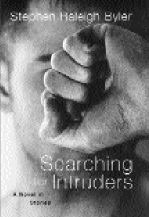SEARCHING FOR INTRUDERS by Stephen Raleigh Byler William Morrow & Co., $23.95
THIS COULD BE a terrible first novel or a failed literary experiment. Let’s consider the evidence: Our young married grad-student protagonist ends up a loveless, unemployed drifter on the coast of Chile. What a clich魭the standard slacker downfall narrative, right? We’ve read too many such bottoming-out stories before and are accustomed to their familiar conventions. So maybe our hero is a Bukowski-style gutter poet who prefers wine to work. Maybe he’s too smart, too sensitive to be a philosophy TA. Maybe his beauty-queen-turned-rape-counselor wife doesn’t understand him. Maybe the roaches that infest their N.Y.C. starter apartment aren’t his fault. (“Honey, I forgot to take out the garbage because I was too engrossed in Heidegger!”)
Or, scenario B, maybe Wilson Hues is the more educated cousin to Forrest Gump—a Pennsylvania nitwit who never outgrows his own solipsism and private obsessions. “I’ll admit that I have kind of a problem,” our hero declares, “that I can become very emphatic in a discussion of the metaphorical, even metaphysical, implications of certain events and objects.”
One woman who witnesses a stoned, rantlike “discussion” of this variety—about roaches, natch—appraises his behavior more succinctly: “[T]his is weirding me out.” Maybe that’s unfair. Who among us hasn’t felt misunderstood? Who hasn’t resented the universe’s ignoring our genius and untapped potential? It’s the freakish little people who keep dragging us down. Once we finish this 12-pack of Pabst Blue Ribbon (“PBR”), we’ll show you peasants what’s what.
Would that it were so simple. Wilson relates his life with first-person confessional candor, introducing his wife, Melody, and subsequent cancer-stricken lover, Alethea. His family history unfolds in short interchapters of abuse, dysfunction, and domestic violence, qualifying him to guest on Oprah.
Does that make him a mere victim of childhood trauma? Wilson’s father once drowned puppies and stomped on bunny rabbits—evil so cartoonish as to seem a joke, raising questions about his credibility as a narrator. Could he be making it all up as self-justification for his selfishness and emotional neglect toward women? That, at least, might suggest a cunning agenda—a tale told by a sociopath pretending to be a dolt.
YET THE LANGUAGE provides no such hope for Intruders‘ possible salvation (or reinterpretation). Stephen Raleigh Byler’s unrelentingly flat, affectless prose has hardly a memorable sentence in its 200-plus pages. Again, this seems intentional—but calculated to what end? His hero’s vacuous, whiny tone recalls nothing so much as Jack Handy’s old “Deep Thoughts” on Saturday Night Live. (Handy’s rewrite of Byler would be: “My father used to drown puppies, which was sad. But later in high school, I used the story to get girls to give me blow jobs out of pity.”)
So if Wilson never goes postal, never becomes an entertaining fuckup (think Jernigan), never transcends his half-baked, half-remembered theories of entropy, where does that leave him? And us? “I blame no one but myself,” he offers, and readers will be inclined to agree. The only possibly redeeming (and exceptionally charitable) interpretation is that Byler is offering his protagonist as a cautionary example, a case study in male self-pity and fecklessness. In that admittedly aggressive reading, Wilson’s Oprah-ready excuses (“I was taking some kind of personal revenge,” “disturbing and violent memories from my early life”) might conceivably be satire. If they were smart or funny.
Byler subtitles his book “a novel in stories,” and Intruders does read like a collection of poorly connected, mediocre short stories. They put you in mind of filmmaker Todd Solondz (Happiness, Storytelling), who induces squirming discomfort and embarrassed laughter from our self-recognition in schmucks like Wilson. Intruders‘ milieu and encounters are similar, but Byler has none of the art, intelligence, or conflicted contempt that Solondz bears upon his gallery of losers. Search out something else at the bookstore.
bmiller@seattleweekly.com









